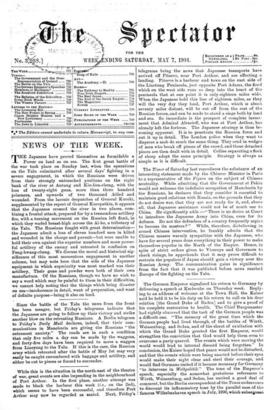T HE Japanese have proved themselves as formidable a Power on
land as on sea. The first great battle of the war took place on Sunday last, when the operations on the Yalu culminated after several days' fighting in a severe engagement, in which the Russians were driven from their strongly entrenched pos. itions on the right bank of the river at Antung and Kiu-lien-cheng, with the loss of twenty-eight guns, more than three hundred Prisoners, and upwards of two thousand ,killed and wounded. From the laconic despatches of General Kuroki, supplemented by the report of General Kuropatkin, it appears that the Japanese crossed the river in two places, com- bining a frontal attack, prepared for by a tremendous artillery fire, with a turning movement on the Russian left flank, in which they waded breast-high across the .Ai-ho, a tributary of the Yalu. The Russians fought with great determination— the Japanese admit a loss of eleven hundred men in killed and wounded in the charge and pursuit—but were unable to hold their own against the superior numbers and more power- ful artillery of the enemy and retreated in confusion on Feng-hwang-cheng. We discuss the moral and historical sig- nificance of this most momentous engagement in another column, but may note here that the side of the Japanese equipment in which superiority was most marked was their artillery, Their guns and powder were both of their own manufacture. Of the Russians, though we have no wish to say a word which may be painful to them in their difficulties, we cannot help noting that the things which bring disaster on sea—incoherence in detail, want of preparation, and want of definite purpose—bring it also on land.










































